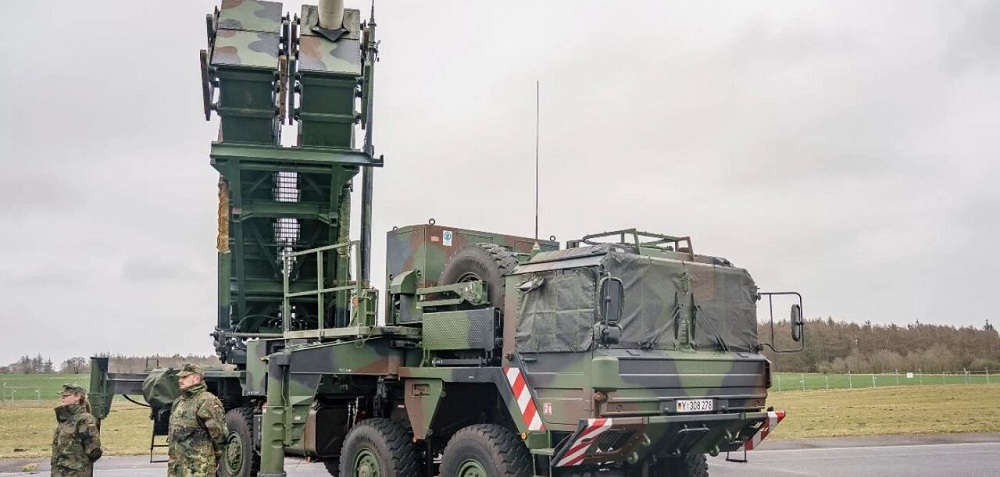The Politico revealed in a report that Washington is negotiating with Arab countries to transfer a batch of air defenses stationed in the region to Ukraine. Gregory J. Hayes, the executive director of Raytheon Technologies defense company said the purpose of this action is to send National Advanced Surface-to-Air Missile Systems (NASAMS), within the next three to six months. Washington would replace these new interceptors with the older systems, he continued.
Hayes further said that advanced US surface-to-air missile systems are spread throughout West Asia region and that Washington and NATO are currently negotiating with two regional countries that use these systems to transfer them to Ukraine. He declined to name the two countries that are expected to send the systems to Kiev, however, Politico reported that according to the Defense Security Cooperation Agency records, the two countries are Qatar and Oman.
NASAMS is a medium to long-range surface-to-air missile defense system that Ukraine requested from the US because Russian weapons can hit targets more than 100 miles away. The dispatch of these weapons to Ukraine is in a situation that Kremlin officials have repeatedly said that any shipment of NATO weapons to Ukraine will be in the fire range of the Russians. So far they have destroyed thousands of tons of ammunition before they could reach their destination.
Stretching begging hands to Arabs
The transfer of defense systems from the Persian Gulf is while these Arab countries have paid for these defense systems in the past years and they need them to ensure their security, but the Americans are bullying these states to make up for their shortcomings in Ukraine war.
This is not the first time that the US extorts the Arabs. In September 2021, after the American withdrawal from Afghanistan, the Pentagon removed a number of Patriot missile systems from Saudi Arabia. The withdrawal of missile and defense systems from the Arab countries is while Washington has opened new fronts with its rivals and this issue has imposed a lot of costs on it. That is why it is reaching out to its Arab allies to put part of the financial burden of its ambitious agenda on them.
Although Oman and Qatar have been named as the origin of the transfer of defense systems to Ukraine, there is a possibility that other Persian Gulf monarchies will also participate in the supply of such weapons. Saudi Arabia and the UAE took a cautious stance in the Ukraine crisis to avoid tensions with Russia, and perhaps the names of these countries have not been mentioned to avoid Moscow's reaction, and they are secretly trying to help the US.
The exit of the US air defenses takes place in a very sensitive stage in which Washington intends to form Arab NATO and a drone fleet to counter the so-called Iranian threats. Earlier, the Saudis were worried about Patriot systems withdrawal and now Qatar and Oman seem to have to conceded to Washington demands.
Ukraine war depleting Western ammunition stockpiles
The US plan to remove the air defenses from the Persian Gulf comes as in recent months, the Western media and officials announced that the Western ammunition stockpiles are being depleted by the war in Ukraine. In a November report, the New York Times held that two-third of the NATO members have finished their ammunition reserves shippable to Ukraine. The EU foreign policy chief Josep Borel admitted this and called on all NATO members to spend more on defense.
The West believes that it has to defend Ukraine at full tilt for a victory over the Russians. But the Western countries seem to have been running into troubles.
American military experts have said that many of the country's missiles are running out, and if the arms companies want to produce as many as their previous stocks, it will take three years. Besides, production of these advanced weapons will cost the American government several billion dollars.
The drop in the American stockpiles is so worrisome that, Reuters reported, the Pentagon intends to deliver cheap bombs to Kiev. Although 20 NATO members are supporting Ukraine with arms, they have failed to realize their goal of grounding Russia. A longer conflict means a war of attrition which would prove detrimental to the West more than to Russia. The Western sanctions that were supposed to push Russian economy to collapse are practically ineffective and the Russians replaced European customers with new ones in Asia and other continents.
With the heavy costs of war pressuring the West, the White House officials have recently pressed Ukraine to return to talks with Russia and walk back from its demands for taking back territories Russia annexed. The West is certain that Moscow would not return the annexed territory, which accounts for 15 percent of Ukraine territory, to Kiev, and the war outlook bears no signs of Ukraine victory; rather, it will put heavy pressures on the American and European economies.
Delivery of new arms to Ukraine to make a difference on the
ground not only does not benefit the West but also prolongs the war and
a longer war means heavier costs and more biting financial and energy
crisis.
/129

